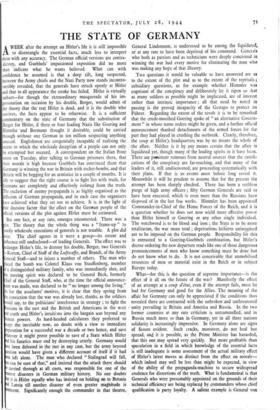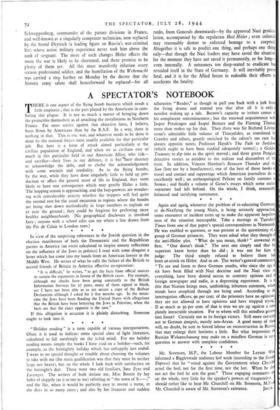THE STATE OF GERMANY A WEEK after the attempt on Hitler's
life it is still impossible to disentangle the essential facts, much less to interpret them with any accuracy. The German official versions are contra- dictory, and Goebbels' impassioned exposition did no more than indicate what he wants believed. What can with confidence be assumed is that a deep rift, long suspected, between the Army chiefs and the Nazi Party now stands incontro- vertibly revealed, that the generals have struck openly at Hitler and that to all appearance the stroke has failed. Hitler is virtually unhurt—for though the 'extraordinary masquerade of his im- personation on occasion by bis double, Berger, would admit of the theory that the real Hitler is dead, and it is the double who survives, the facts appear to be otherwise. It is a sufficient ommentary on the state of Germany that the substitution of Berger for Hitler, if three or four leading Nazis like Goering and Himmler 'and Borman thought it desirable, could be carried through without one German in ten million suspecting 'anything unusual. Englishmen are congenitally incapable of realising the tent to which the wholesale deception of a people can not only be attempted but succeed. A correspondent on the Italian front wrote on Tuesday, after talking to German prisoners there, that their morale is high because Goebbels has convinced them that Germany is winning the war in Britain with rocket-bombs, and that Britain will be begging for an armistice in a couple of months. It is idle to suggest that the right course is to fight lies with truth, for ermans are completely and effectively isolated from the truth. he exclusion of enemy propaganda is as highly organised as the usion of German propaganda, and in each case the organisers ye achieved what they set out to achieve. It is in the light of at decisive factor that the effect on the German people of the fficial versions of the plot against Hitler must be estimated.
But one fact, at any rate, emerges uncontested. There was a lot. The theory that the whole thing was a " frame-up " to ustify wholesale executions of generals is not tenable. A plot did xist. The chief agents in it were a group—its extent and uence still undisclosed—of leading Generals. The effect was to ndanger Hitler's life, to destroy his double, Berger, two Generals Konen, Chief of Staff of the Luftwaffe, and Brandt, of the Army eneral Staff—and to injure a number of others. The man who laced the bomb was Colonel Klaus von Stauffenberg, member f a distinguished military family, who was immediately shot, and moving spirit was declared to be General Beck, formerly 'ef of the General Staff, who, at the time the official announce- ent was made, was declared to be " no longer among the living." for the assailants' motives, it is clear that they spring from conviction that the war was already lost, thanks, as the soldiers ould say, to the politicians' interference in strategy ; to fight the ussians in the east and the British and Americans in the west south and Hitler's intuitions into the bargain was beyond any Lunen powers. As hard-headed calculators they preferred to ept the inevitable now, no doubt with a view to immediate eparation for a successful war a decade or two hence, and save tever it might prove possible to save of a State which Hitler his fanatics must end by destroying. utterly. Germany would ye been defeated in the east in any case, but the army beyond estion would have given a different account of itself if it had a left alone. The man who declared " Stalingrad will fall, u can be sure of that," and insisted that the attack there should carried through at all -costs, was responsible for one of the eatest disasters in German military history. No one doubts t it is Hitler equally who has insisted on holding ern to Estonia Latvia till another disaster of even greater maghitude is ent. Significantly enough the commander in that theatre, General Lindemann, is understood to be among the liquidated, or at any rate to have been deprived of his command. Generals who both as patriots and as technicians were deeply concerned in winning the war had every motive for eliminating the man who was making any hope of that illusory.
Two questions it would be valuable to have answered are as to the extent of the plot and as to the extent of the reprisals ; subsidiary questions, as for example whether Himmler was cognisant of the conspiracy and deliberately let it ripen so that as many soldiers as possible might be implicated, are of interest rather than intrinsic importance ; all that need be noted in passing is the proved incapacity of the Gestapo to protect its Fiihrer. Regarding the extent of the revolt it is to be remarked that the crude-mouthed Goering spoke of " an alternative Govern- ment " in whose name orders might be given, and a further official announcement thanked detachments of the armed forces for the part they had played in crushing the outbreak. Clearly, therefore, the coup at Hitler's headquarters was by no means the whole of the affair. Neither is it by any means certain that the affair is liquidated yet, though many of the leading spirits in it have been. There are pepsistent rumours from neutral sources that the ramifi- cations of the conspiracy are far-reaching, and that many of the leaders of it, still undiscovered, are proceeding systematically with their plans. If that is so events must before long reveal it. Meanwhile it will be prudent to assume that for the present the attempt has been sharply checked. There has been a ruthless purge of high army officers ; fifty German Generals are said to have been executed, which is even more than the Russians have disposed of in the last few weeks. Himmler has been appointed Commander-in-Chief of the Home Forces of the Reich, and it is a question whether he does not now wield more effective power than Hitler himself or Goering or any other single individual. The watchword is to be blood and iron ; the State is to be more totalitarian, the war more total ; deprivations hitherto unimagined are to be imposed on the German people. Responsibility f this is entrusted to a Goering-Goebbels combination, but Hitler's decree ordering the new departure reads like one of those dangerous pronouncements of men who know something must be done but do not know what to do. It is not conceivable that unmobilised resources of men or material exist in the Reich or in subject Europe today.
What—for this is the question of supreme importance—is the effect of it all on the future of the war? Manifestly the effect of an attempt at a coup d'etat, even if the attempt fails, must be bad for Germany and good for the Allies. The meaning of the affair for Germany can only be appreciated if the conditions thus revealed there are contrasted with the unbroken and unthreatened • unity prevailing in Britain and America and Russia. In the two former countries at any rate criticism is untrammelled, and in Russia much more so than in Germany, yet in all three nations solidarity is increasingly impressive. In Germany alone are signs of fissure evident. Such cracks, moreover, do not heal but spread, and it is possible, as the Prime Minister has hazarded, that this one may spread very quickly. But more profitable than speculation in a field in which knowledge of the essential facts is still inadequate is some assessment of the actual military effect of Hitler's latest moves as distinct from the effect on morale— which indeed may well be less than might be expected, in view of the ability of the propaganda-machine to secure widespread credence for distortions of the truth. What is fundamental is that Generals who were presumably appointed on the grounds of their technical efficiency are being replaced by _commanders whose chief qualification is party loyalty. A salient example is General von Schweppenberg, commander of the panzer divisions in France, and well-known as a singularly competent technician, now replaced by the brutal Deytrich (a leading figure on Russia's war-criminal list) whose active military experience never took him above the rank of sergeant. The more of such changes Hitler effects the more the war is likely to be shortened, and there promise to be plenty of them yet. All this must manifestly infuriate every serious professional soldier, and the humiliation of the Wehrmacht was carried a step further on Monday by the decree that the historic army salute shall henceforward be replaced—for all ranks, from Generals downwards—by the approved Nazi gesticu. lation, accompanied by the regulation Heil Hitler ; even colonels may reasonably demur to enforced homage to a corporal. Altogether it is safe to predict one thing, and perhaps one thing only—that though the Nazi leaders may have saved the situation for the moment they have not saved it permanently, or for long—. even internally. A rottenness too deep-seated to eradicate has revealed itself in the State of Germany. It will inevitably prove fatal, and it is for 'the Allied forces to redouble their efforts to accelerate the fatality.



























 Previous page
Previous page